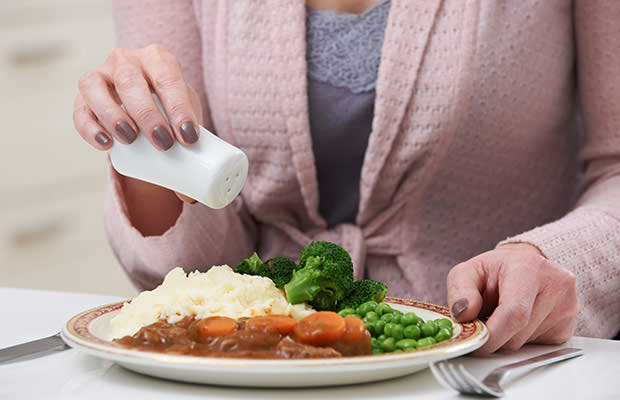Raised blood pressure (or hypertension) is major factor which causes strokes, heart failure and heart attacks, the leading causes of death and disability in the whole world. There is also increasing evidence of a link between high salt intake and stomach cancer, osteoporosis, obesity, kidney stones, kidney disease and vascular dementia and water retention. Salt can exacerbate the symptoms of asthmaand diabetes.
The body removes unwanted fluid by filtering blood throughthe kidneys. Here any extra fluid is sucked out and put into a bladder to be removed as urine. To do this, the kidneys use osmosisprocessto draw the extra water out of the blood. This process uses a delicate balance of sodium and potassium to pull the water across wall of cells from the bloodstream in a collecting channel that leads to the bladder.
Eating salt raises the amount of sodium in bloodstream and wrecks the delicate balance, reducing the ability of kidneys to remove the water. The result is a high blood pressure due to the extra fluid and extra strain on the delicate blood vessels leading to the kidneys.
The extra blood pressure caused by eating too much salt puts extra strain on the insides of arteries. To cope with the extra strain, the muscles in the artery walls become stronger and thicker. This is yet only makes the space inside the arteries smaller and raises your blood pressure even higher.
Raised blood pressure caused by eating very much salt may damage the arteries, which leading to the heart.It may cause a slight reduction in the amount of blood reaching the heart. It’s lead to angina. With this condition the cells in the heart don't work as they should because they are not receiving enough oxygen and nutrients. Lowering blood pressure may help to alleviate the problems and reduce the risk of damages.
If you continue to eat too much salt then, overtime, the damage caused by the higher blood pressure may become so severe that the arteries burst or become completely clogged.

A high salt diet also increases the risk of stomach cancer. A quarter of the 7000 new cases each year can be attributed to salt, research says. The bacterium Helicobacter pylori is the major risk factor for stomach cancer as it can cause inflammation of the stomach, which can in turn lead to stomach ulcers and stomach cancer. Men are at a higher risk than women and there are important risk factors for stomach cancer explained in the fact sheet.
Salt can raise the risk of diabetes by raising blood pressure. People who already have diabetes can also benefit from eating less salt cause keeping blood pressure in the healthy range helps to reduce the risk of the long term complications of diabetes.
How to eat less salt?
An adult should eat no more than 5 g of salt a day, but most of us eat much more than this. Most of the salt we eat every day is practically “hidden”. Roughly 80% of the salt we eat is hiding in processed foods like bread, biscuits and breakfast, and prepared ready meals or takeaways, so only 20% comes from the salt we add while cooking or at the table.
The best way is to try to always eat foods with the lowest salt level. At first, food without salt can taste bland, but don’t give up– it’s just the same as giving up sugar in tea. And after a few weeks your taste buds will adjust and you’ll start to enjoy food with less salt. You'll wonder how you ever ate food that was so salty!









Deja tu consulta/Leave your query Cancel Reply